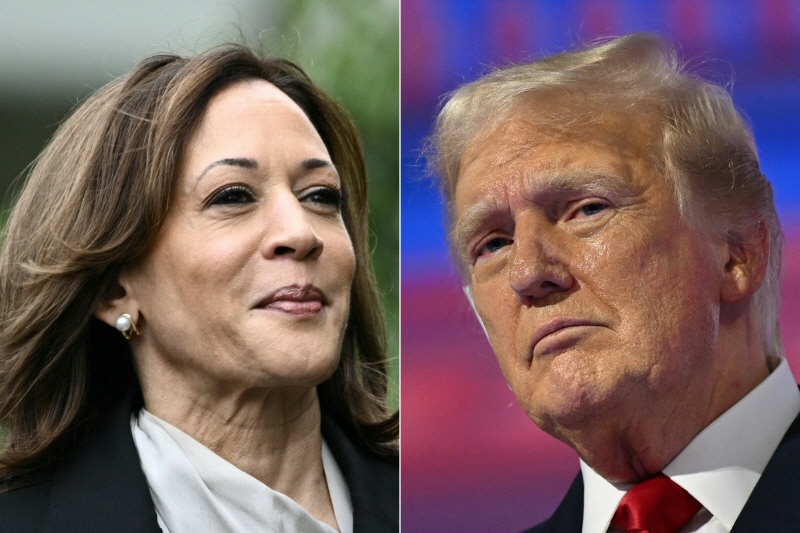Political debates among Korean Americans are intensifying.
As the November presidential election approaches, issues such as former President Donald Trump being named the Republican presidential candidate and current President Joe Biden’s withdrawal from the race are heating up political debates among Korean-American voters. With some 100 days left until the election, the political atmosphere is becoming increasingly charged.
Cheol-mae Kim, owner of BBQ Garden in Koreatown, LA, said, “After Trump was shot, some of my customers got into heated arguments about politics, which was quite difficult to manage,” adding, “As the election approaches, it feels like the political season is back.”

Opinions on candidates are divided. Korean-American voters, while generally interested in the selection of the Democratic Party’s new presidential candidate, also acknowledge Trump’s growing influence.
Erin Oh, a 32-year-old nurse awaiting her citizenship interview next month, harshly criticized President Biden. She believes that the attack on Trump has solidified his image as a strong leader who prioritizes Americans.
“I can’t think of any positive changes during Biden’s administration,” Oh said. “Although Biden has withdrawn from the presidential race, I don’t think the new Democratic candidate will beat Trump.”
On the other hand, some believe that the Democratic Party has a chance if it puts forward a fresh candidate. An official from the Korean American Federation of LA stated, “With President Biden withdrawing from the presidential race, people are likely to be more interested in the election, hoping for a new face. If a new figure like Vice President Kamala Harris, a Black woman, goes up against Trump, voter turnout will increase.”
Edward Koo, Senior Advisor for the Korean American Democratic National Organization, said, “After President Biden’s withdrawal, there’s a sense of welcome and unity within the Democratic Party. Trump’s ‘America First’ policies might push moderates who oppose his policies towards the Democratic side.”
Korean-American voters identified key issues influencing their choice of candidate, including price stability, the U.S.-ROK alliance and U.S. troops in Korea, America-first policies, and immigration policies. Voters in California also show significant interest in policies related to minority sexual identity.
Jae-kwon Kim, Senior Advisor for the Korean Veterans Association of America’s Western Chapter, described himself as an undecided moderate who has not yet chosen whom to vote for.
“Most Korean American voters, who tend to be Christian, support Trump, but there are concerns about potential U.S. troop reductions in Korea if Trump is re-elected,” he said, reflecting his complicated feelings.
As a new election landscape unfolds, some are calling for Korean American voters to make wise choices. Observers stress that after considering Trump’s momentum and the Democratic Party’s new candidate, the community should vote in a way that benefits them.
Bong-hyun Kim, co-chair of the Korean American Leaders Committee, noted, “Shortly after President Biden’s withdrawal, the Democratic Party reportedly raised millions of dollars in donations. Many voters are struggling with inflation and the tax burden from accommodating undocumented immigrants, so we need to think about which party is more attentive to our needs.”
Meanwhile, some are contemplating citizenship ahead of the election. Lee, a 47-year-old Korean who obtained permanent residency three years ago, said, “I became interested after hearing that many permanent residents acquired citizenship during Trump’s presidency.”
According to U.S. Citizenship and Immigration Services (USCIS), the years 2018 (16,040) and 2019 (16,299) saw the highest number of Korean Americans obtaining citizenship, marking the first time naturalizations exceeded 16,000 annually.
An official from the Korean American Federation of LA emphasized, “With Trump’s presidential run and the Democratic Party’s selection of a new candidate, even those who previously showed no interest in elections are reconsidering. It would be beneficial if more Korean Americans registered to vote and participated in the November election.”
Additionally, Korean government agencies and Korean companies are swiftly analyzing the situation. A Korean corporate representative stated, “Fortunately, due to increased production facilities in the U.S. during the Trump administration, we expect fewer sudden responses will be necessary this time.”
BY HYOUNGJAE KIM, EUNBYUL KIM, YOUNGNAM KIM [kim.ian@koreadaily.com]




